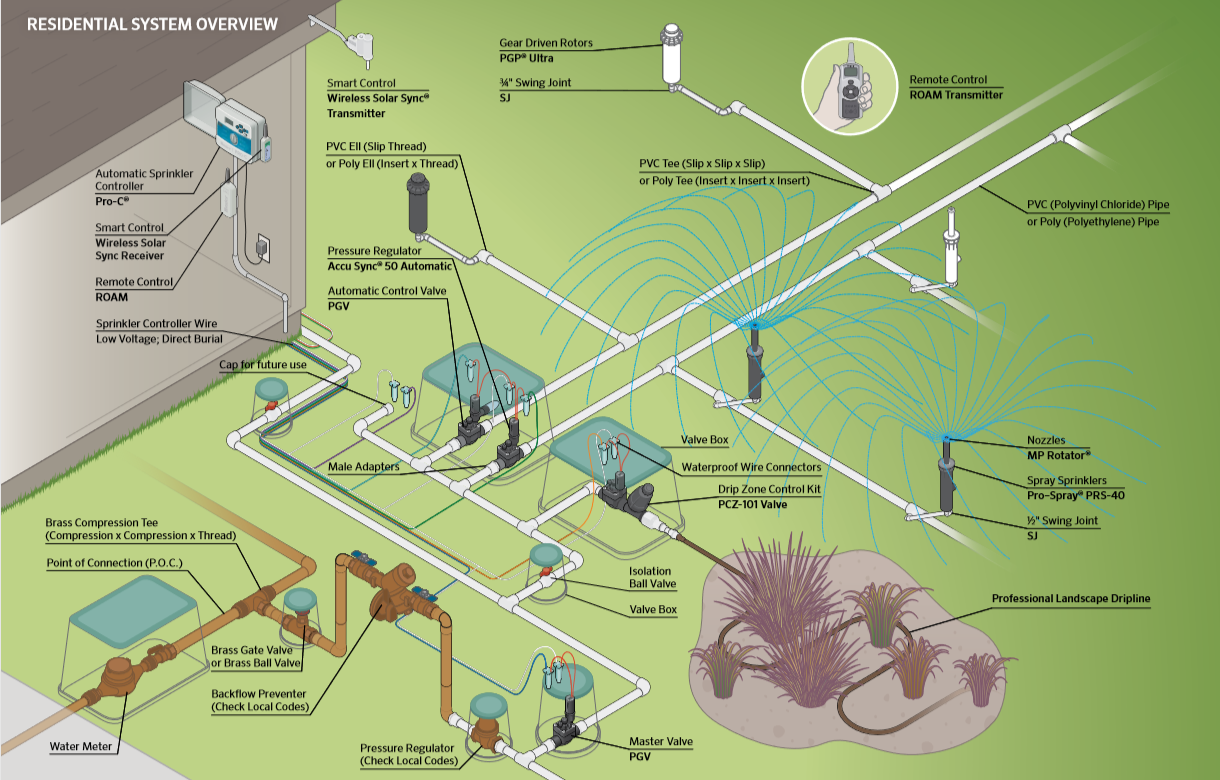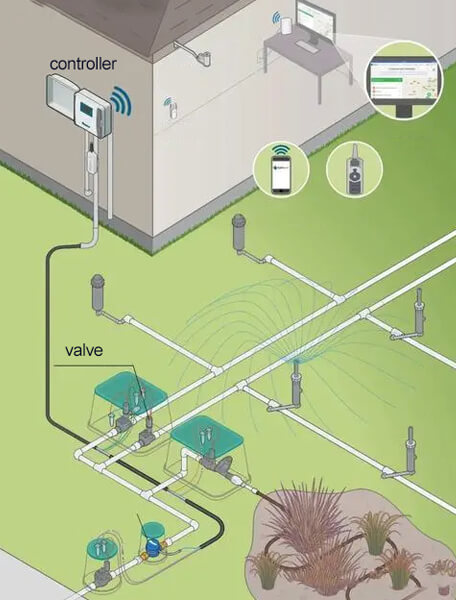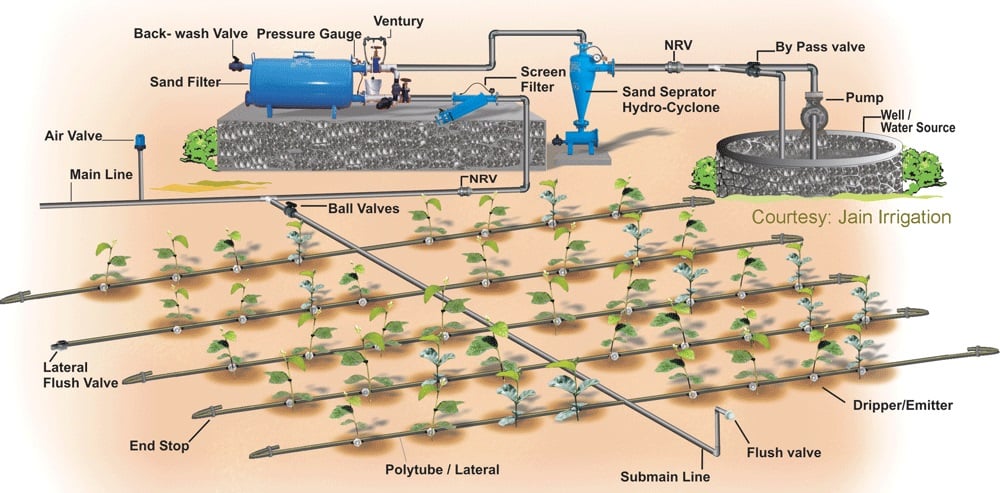An irrigation system delivers water to crops through a network of pipes, pumps, and sprinklers. It maintains soil moisture for optimal plant growth.
Irrigation systems play a crucial role in agriculture, ensuring crops receive adequate water. They help farmers manage resources effectively and boost yields. Different types of systems exist, including drip, sprinkler, and surface irrigation. Each has unique benefits tailored to specific needs and environments.
Understanding how these systems work can lead to better water conservation and improved crop health. As agriculture faces challenges like climate change and water scarcity, efficient irrigation becomes even more essential. This blog explores the mechanics of various irrigation systems and their importance in modern farming practices.

Credit: extension.okstate.edu
How Does an Irrigation System Work : Step by Step Guide
The Essence Of Irrigation Systems
Irrigation systems are vital for successful agriculture. They provide water to crops, ensuring growth and health. Without them, many areas would struggle to produce food.
Different types of modern irrigation include:
| Type | Description |
|---|---|
| Drip Irrigation | Delivers water directly to plant roots using tubes. |
| Sprinkler System | Water is sprayed over crops like rain. |
| Surface Irrigation | Water flows over the soil surface to reach plants. |
These systems increase crop yield and save water. Using technology, farmers can manage water use efficiently.
Components Of An Irrigation System
The components of an irrigation system include several key parts. The water source can be a river, lake, or well. Proper storage ensures water is available when needed.
The pumping mechanisms draw water from the source. They can be electric or solar-powered. Pumps must be strong enough to move water efficiently.
A distribution network delivers water to plants. This network includes pipes, hoses, and sprinklers. Effective design helps water reach every area evenly.
Types Of Irrigation Techniques
Surface irrigation involves water flowing over the soil surface. It relies on gravity to distribute water. This method is simple and cost-effective. However, it can lead to uneven water distribution.
Drip irrigation delivers water directly to the plant roots. Tubes with small holes release water slowly. This method conserves water and reduces weed growth. It is ideal for gardens and farms.
Sprinkler systems spray water like rain. They can cover large areas efficiently. These systems are versatile and can be used for lawns and crops. They work well in different soil types.
Subsurface irrigation places pipes underground. Water seeps directly into the soil. This method reduces evaporation and keeps the surface dry. It is useful for deep-rooted plants.

Credit: www.renkeer.com
The Science Behind Water Distribution
The science behind irrigation systems relies on hydraulic principles. Water moves through pipes due to pressure differences. This pressure helps to control water flow in the system.
Water flow control is essential for effective irrigation. It ensures that each plant receives the right amount of water. Valves and sensors play key roles in managing this flow. They can detect moisture levels in the soil.
Using gravity in some systems helps water reach lower areas. Pumps can also increase water pressure for higher elevations. Both methods support efficient water distribution.
Efficiency And Sustainability
Efficient irrigation systems help save water and promote sustainability. They use various methods to reduce waste. Simple techniques include drip irrigation, which delivers water directly to the roots. This method minimizes evaporation and runoff.
Rainwater harvesting is another effective strategy. Collecting rainwater for irrigation reduces the need for groundwater. Using mulch around plants also helps retain moisture and prevents weed growth.
Soil moisture sensors are useful tools. They alert farmers when to water crops, ensuring optimal hydration. Crop rotation and selecting drought-resistant plants further enhance water conservation.
| Water Conservation Strategy | Description |
|---|---|
| Drip Irrigation | Delivers water directly to plant roots, reducing evaporation. |
| Rainwater Harvesting | Collects rainwater to irrigate crops, minimizing groundwater use. |
| Soil Moisture Sensors | Helps determine when to water, optimizing water use. |

Credit: interestingengineering.com
The Impact Of Climate On Irrigation
Climate greatly affects irrigation systems. Different weather patterns require different approaches. Farmers must adapt to changes. This ensures crops receive enough water.
Climate-smart irrigation solutions help manage water efficiently. These methods reduce waste and improve crop yield. Drip irrigation delivers water directly to the plant roots. This method conserves water and reduces evaporation.
Using smart technology can further enhance irrigation. Sensors can monitor soil moisture levels. This data helps farmers apply the right amount of water. Rainwater harvesting is another effective strategy. It collects and stores rain for later use.
Technological Advancements In Irrigation
Smart irrigation systems use technology to manage water use efficiently. They often rely on sensors to measure soil moisture. These systems can adjust water flow based on real-time data.
Automation plays a key role in modern irrigation. It allows systems to operate without constant human input. Remote monitoring enables users to check system status from anywhere. This feature saves time and ensures crops receive the right amount of water.
Some benefits of smart irrigation systems include:
- Water conservation: Reduces water waste.
- Cost savings: Lowers water bills.
- Healthier plants: Ensures optimal growth conditions.
- Easy management: Simplifies the watering process.
Challenges And Solutions In Irrigation
Water scarcity poses a serious challenge for farmers. Many regions face limited access to water. Effective irrigation systems help manage this precious resource. Technologies such as drip irrigation can significantly reduce water waste.
Innovations are crucial for efficient water use. Smart irrigation systems use sensors to monitor soil moisture. These systems apply water only when needed, saving both time and resources. Rainwater harvesting is another effective method. Collecting rainwater can supplement traditional irrigation sources.
Regular maintenance of irrigation systems also plays a key role. Checking for leaks or blockages ensures optimal performance. Training farmers on modern techniques can further enhance water efficiency.
Frequently Asked Questions
How Does An Irrigation System Function?
An irrigation system delivers water to plants efficiently. It works by using various components like pipes, pumps, and sprinklers. These elements distribute water evenly across the landscape. Proper scheduling and controls ensure that plants receive the right amount of water, promoting healthy growth and conserving resources.
What Are The Main Types Of Irrigation Systems?
The main types of irrigation systems include drip, sprinkler, and surface irrigation. Drip systems provide water directly to the roots, reducing waste. Sprinkler systems mimic rainfall, while surface irrigation uses gravity to distribute water. Each type has its advantages, making them suitable for different landscapes and crops.
Why Is Irrigation Important For Agriculture?
Irrigation is crucial for agriculture as it ensures consistent water supply. It helps to improve crop yield and quality, especially in dry regions. By controlling water application, farmers can manage soil moisture effectively. This leads to better growth, reduced drought impact, and increased food security.
How Often Should I Irrigate My Garden?
Irrigation frequency depends on various factors like plant type, soil, and climate. Generally, gardens need watering 1-2 times per week. During hot or windy conditions, more frequent irrigation may be necessary. Monitoring soil moisture will help you determine the right schedule for optimal plant health.
Conclusion
Understanding how an irrigation system works is essential for effective water management. These systems promote healthy plants and conserve water. By using the right irrigation method, you can enhance your garden’s growth while minimizing waste. Invest in a suitable system to ensure your plants thrive and your water usage remains efficient.

